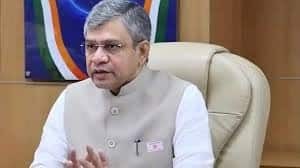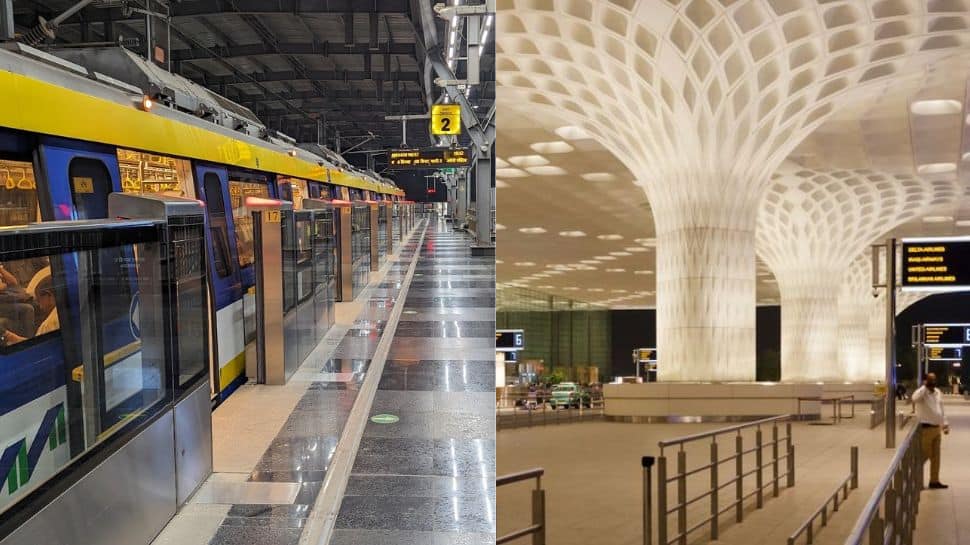Business
Ashwini Vaishnaw Flags Off 3 New Amrit Bharat Trains From Bihar: Check Route, Timing, Expected Fare, Other Details

New Amrit Bharat Trains For Bihar: Ahead of the state assembly polls, Bihar has got yet another gift from the Indian Railways. Union Railway Minister Ashwini Vaishnaw inaugurated seven new train services from Bihar, including three Amrit Bharat Express trains aimed at providing affordable long-distance travel options for lower and middle-income passengers.
Developed by Indian Railways, the Amrit Bharat Express has become a symbol of modernization in the country’s railway system. The train is not just a fast and affordable travel option, but it also comes equipped with advanced features such as semi-automatic couplers, fire detection systems, sealed gangways, and talk-back units. For the first time, advanced technology has been introduced in non-AC coaches as well for passenger safety.
New Amrit Bharat Routes
Railway Minister Ashwini Vaishnaw on Sunday virtually flagged off new train services from New Delhi, while Bihar Deputy Chief Minister Samrat Choudhary conducted a symbolic inauguration at Patna Junction.
The newly launched Amrit Bharat Express trains will connect Darbhanga–Madar (Ajmer), Muzaffarpur–Charlapalli (Hyderabad), and Chhapra–Anand Vihar (Delhi). Alongside, four new passenger trains have been introduced on shorter regional routes within Bihar: Jhajha–Danapur, Patna–Buxar, Nawada–Patna, and Patna–Islampur.
The Amrit Bharat Express—positioned as a more affordable counterpart to the premium Vande Bharat trains—represents the Centre’s broader push to modernise rail services while keeping them accessible to millions of everyday travellers.
बिहार के छपरा से दिल्ली (आनन्द विहार टर्मिनल) की यात्रा पर रवाना होने को तैयार अमृत भारत एक्सप्रेस।#RailInfra4Bihar #AmritBharatExpress pic.twitter.com/dw76UM7KEy
— Ministry of Railways (@RailMinIndia) September 29, 2025
Train Numnber, Stations And Fare
Train No. 15293/15294 Muzaffarpur–Charlapalli–Muzaffarpur Amrit Bharat Express (Weekly) will operate via Hajipur, Patliputra, Ara, Buxar, Pt. Deen Dayal Upadhyaya Junction, Prayagraj Chheoki, Jabalpur, Itarsi, Nagpur, and Kazipet.
Train No. 19623/19624 Madar–Darbhanga–Madar Amrit Bharat Express (Weekly) will operate via Kamtaul, Sitamarhi, Raxaul, Narkatiaganj, Gorakhpur, Gomti Nagar, Kanpur, Tundla, and Jaipur.
Train No. 15133/15134 Chhapra–Anand Vihar–Chhapra Amrit Bharat Express (Twice Weekly) will operate via Siwan, Thawe, Kaptanganj, Gorakhpur, Basti, Gonda, Aishbagh (Lucknow), and Kanpur.
The details of the trains are yet to be uploaded on the IRCTC website. While the fare is yet to be made public, the likely fare for Darbhanga and Madar will be around Rs 800 while that of Muzaffarpur–Charlapalli will be around Rs 1,000. On the other hand, the fare of Chhaptra-Anand Vihar Amrit Bharat is likely to be around Rs 500.
Previously, Bihar had 10 Amrit Bharat trains operational. With the launch of these three new trains, the state’s connectivity will further improve. This marks an important step towards realizing the vision of “Viksit Bihar Se Viksit Bharat” (Developed India through a Developed Bihar).
Business
Video: How ICE Is Pushing Tech Companies to Identify Protesters

new video loaded: How ICE Is Pushing Tech Companies to Identify Protesters
By Sheera Frenkel, Christina Thornell, Valentina Caval, Thomas Vollkommer, Jon Hazell and June Kim
February 14, 2026
Business
52 reforms in 52 weeks: Ashwini Vaishnaw outlines massive railway overhaul for 2026

Indian Railways has reached a global milestone in freight operations, securing its position as a premier international logistics hub. Union Minister for Railways, Ashwini Vaishnaw, announced today that the national carrier has achieved an unprecedented scale in its logistics division. Highlighting this achievement, the Minister stated, “Indian Railways has become the second-largest cargo carrier in the world.”
Building on this momentum, the Ministry has prepared a rigorous roadmap for the upcoming year aimed at systemic transformation. The government plans to roll out a series of weekly initiatives to modernise every facet of rail travel and transport. Vaishnaw explained the structured timeline, saying, “For 2026, Railways has resolved to implement 52 reforms in 52 weeks.”
The initial phase of this plan will prioritise the passenger experience, with a focus on improving the quality of onboard facilities. The Minister identified the primary starting point for this year-long agenda, noting, “The first reform is better onboard services in Railways.”
In addition to passenger amenities, the government is placing strong emphasis on the “Gati Shakti” initiative to streamline the nationwide movement of goods. This strategic focus is designed to strengthen the country’s supply chain. Vaishnaw confirmed the freight sector’s priority, adding, “The second concerns ‘Gati Shakti Cargo.’”
A cornerstone of the 2026 agenda is a comprehensive overhaul of sanitation and hygiene standards. The Ministry has developed a new blueprint to ensure that the rail network’s cleanliness meets global benchmarks. Detailing the specifics of the first major initiative, the Minister remarked, “Reform number one for 2026 will ensure proper end-to-end cleaning of the Railways… The concept of a clean rail station has been established.”
This cleanliness drive is not a short-term measure but a multi-year commitment to cover the entire Indian Railways fleet. The implementation will be phased to ensure thoroughness and consistency. Vaishnaw clarified the timeline, stating, “Over three years, this reform will be implemented across all trains.”
To ensure the success of these reforms, the Ministry is introducing a robust accountability framework. These measures will include performance-based contracts and the integration of modern digital tools to monitor progress in real time. Emphasising the shift towards professional and technology-driven management, the Minister concluded, “There will be clearly defined service-level agreements… There will be extensive use of technology.”
Business
BrewDog owners say craft beer company could be sold off

Craft beer brand BrewDog could be sold off after the company started the process to find new investors.
The Scottish beer brand recently announced plans to close all of its distilling brands, meaning it would no longer produce any of its spirits, including Duo Rum, Abstrakt Vodka, and Lonewolf Gin, at its distillery in Ellon, Aberdeenshire.
The company, which was founded in 2007, said it made the decision to focus on its beer brands, including the highly-popular Punk IPA, Elvis Juice, and Hazy Jane.
Now, in a statement, a spokesperson for BrewDog said the company had appointed Alix Partners to “support a structured and competitive process to evaluate the next phase of investment for the business.”
The statement said: “As with many businesses operating in a challenging economic climate and facing sustained macro headwinds, we regularly review our options with a focus on the long-term strength and sustainability of the company.
“Following a year of decisive action in 2025, which saw a focus on costs and operating efficiencies, we have appointed AlixPartners to support a structured and competitive process to evaluate the next phase of investment for the business. This is a deliberate and disciplined step with a focus on strengthening the long-term future of the BrewDog brand and its operations.”
Although no decisions have been made, a sale is under consideration.
In a statment BrewDog added: “BrewDog remains a global pioneer in craft beer: a world-class consumer brand, the No.1 independent brewer in the UK, and with a highly engaged global community. We believe that this combination will attract substantial interest, though no final decisions have been made.”
According to reports by Sky News, AlixPartners had begun sounding out prospective buyers in the last few days.
The company, which has 72 bars worldwide and four breweries in Scotland, the US, Australia, and Germany, said its breweries, bars, and venues will continue to operate as normal. It employs 1400 people across the organisation.
BrewDog’s founders James Watt and Martin Dickie are the company’s major shareholders alongside private equity company TSG, which invested £213 million in 2017, making it a 21 per cent shareholder.
In 2024, the beer brand grossed £357 million in sales, and it is a major independent brewer with 4 per cent market share in the UK grocery market.
-

 Entertainment1 week ago
Entertainment1 week agoHow a factory error in China created a viral “crying horse” Lunar New Year trend
-

 Business5 days ago
Business5 days agoAye Finance IPO Day 2: GMP Remains Zero; Apply Or Not? Check Price, GMP, Financials, Recommendations
-

 Tech1 week ago
Tech1 week agoNew York Is the Latest State to Consider a Data Center Pause
-

 Fashion4 days ago
Fashion4 days agoComment: Tariffs, capacity and timing reshape sourcing decisions
-

 Tech1 week ago
Tech1 week agoNordProtect Makes ID Theft Protection a Little Easier—if You Trust That It Works
-

 Tech1 week ago
Tech1 week agoPrivate LTE/5G networks reached 6,500 deployments in 2025 | Computer Weekly
-

 Business1 week ago
Business1 week agoStock market today: Here are the top gainers and losers on NSE, BSE on February 6 – check list – The Times of India
-

 Business1 week ago
Business1 week agoMandelson’s lobbying firm cuts all ties with disgraced peer amid Epstein fallout












